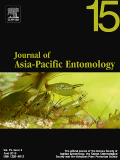
JOURNAL OF ASIA-PACIFIC ENTOMOLOGY
Scope & Guideline
Fostering Insights into the World of Insects
Introduction
Aims and Scopes
- Insect Diversity and Taxonomy:
The journal features studies on the identification and classification of various insect species, including new species descriptions and taxonomic revisions, particularly in the context of the Asia-Pacific region. - Ecological Interactions:
Research on the ecological roles and interactions of insects within their environments, including pollination biology, predator-prey dynamics, and the impact of environmental changes on insect populations. - Insect Physiology and Molecular Biology:
Papers focusing on the physiological mechanisms, genetic studies, and molecular pathways that govern insect behavior, development, and responses to environmental stressors. - Pest Management and Control Strategies:
Studies that explore integrated pest management strategies, the development of biocontrol agents, and the efficacy of natural products and insecticides in controlling pest populations. - Insect-Plant Interactions:
Research investigating the relationships between insects and plants, including herbivory, pollination, and the effects of host plant characteristics on insect behavior and development. - Applications of Insect Biotechnology:
Exploration of biotechnological approaches involving insects, such as the use of insect-derived compounds in medicine, agriculture, and food production.
Trending and Emerging
- Molecular Ecology and Genomics:
There is an increasing trend towards incorporating genomic and molecular techniques to investigate insect diversity, evolutionary relationships, and responses to environmental changes, reflecting advancements in technology. - Insect-Based Food and Nutritional Studies:
Research exploring the potential of insects as food sources and their nutritional benefits is gaining traction, driven by a growing interest in sustainable food systems. - Climate Change Impact Studies:
A significant rise in studies examining the effects of climate change on insect populations and their interactions with ecosystems highlights the urgent need to understand and mitigate these impacts. - Biocontrol and Sustainable Pest Management:
There is a notable increase in research focused on biological control methods and environmentally friendly pest management strategies, aligning with global sustainability goals. - Insect-Microbe Interactions:
Emerging studies on the interactions between insects and their microbial symbionts are becoming more prevalent, emphasizing the importance of microbiomes in insect health and ecology. - Urban Entomology:
Research pertaining to insect interactions in urban environments is on the rise, addressing the unique challenges posed by urbanization on insect populations and biodiversity.
Declining or Waning
- Traditional Insecticide Efficacy Studies:
Research focusing solely on the efficacy of traditional chemical insecticides without considering integrated approaches or ecological impacts has seen a decline, as the field shifts towards more sustainable and integrated pest management practices. - Generalized Ecological Studies without Specific Context:
Studies that lack specific contextual applications or that do not address the unique ecological dynamics of the Asia-Pacific region have become less common, as the journal emphasizes more targeted and relevant research. - Descriptive Studies without Molecular Insights:
There is a noticeable decrease in purely descriptive studies of insect behavior or ecology that do not integrate molecular or genetic insights, reflecting a shift towards more interdisciplinary approaches. - Static Taxonomic Reviews:
Taxonomic reviews that do not include new data or molecular analysis are becoming less frequent, as the journal encourages more dynamic and data-driven contributions.
Similar Journals

BULLETIN OF INSECTOLOGY
Pioneering Discoveries in Insect ResearchBULLETIN OF INSECTOLOGY is a prominent academic journal published by ALMA MATER STUDIORUM, UNIV BOLOGNA, Italy, specializing in the field of Insect Science. The journal, with ISSN 1721-8861 and E-ISSN 2283-0332, has established itself as a vital resource for researchers and professionals interested in the diverse aspects of entomology and its applications. It ranks in the Q2 category for Insect Science as of 2023, placing it among the top journals in its field with a Scopus rank of 79 out of 181. The BULLETIN OF INSECTOLOGY is committed to disseminating high-quality research and innovative studies, facilitating open dialogue and collaboration among scientists. As an essential platform for sharing groundbreaking findings, it contributes significantly to the body of knowledge in agricultural and biological sciences, making it an invaluable asset for scholars and practitioners alike. With coverage from 2002 to 2024, this journal continues to foster advancements in entomological research and its importance in tackling environmental challenges.

Insects
Unleashing Knowledge in Insect Ecology and BehaviorInsects is a prominent open-access journal published by MDPI, dedicated to advancing research in the vibrant field of insect science. Since its inception in 2011, this journal has become a vital resource for academics and professionals alike, also ranked in the prestigious Q1 category within the Insect Science field by Scopus, achieving a remarkable rank of 26 out of 181 journals. With an ongoing convergence period from 2010 to 2024, Insects provides comprehensive coverage of various aspects of entomology, including but not limited to ecology, behavior, physiology, and applied entomology. Based in Switzerland, the journal promotes an open-access model, ensuring that vital research is readily available to researchers, practitioners, and students globally. This journal not only facilitates the dissemination of groundbreaking entomological research but also fosters collaboration and interdisciplinary dialogue in the field.

Austral Entomology
Innovating Insect Science for Ecological ImpactAustral Entomology, published by Wiley, is a leading journal in the field of entomology, specializing in the study of insects within the wider context of agronomy, ecology, and evolutionary biology. With an impact factor that reflects its growing influence and a commendable H-Index, this journal serves a vital role in disseminating cutting-edge research that bridges the gap between basic entomological studies and applied agricultural practices. Since its inception in 2014, Austral Entomology has maintained a strong commitment to open access, fostering a collaborative environment for researchers and practitioners. Recognized within category quartiles Q2 across multiple fields such as Agronomy and Crop Science and Ecology, it ranks impressively among journals in Insect Science, showcasing the significance of its contributions to understanding insect behavior, ecology, and systematics. Given its robust accessibility options, the journal not only enhances the visibility of entomological research but also empowers professionals and students alike to engage with and apply findings in real-world contexts.

REVISTA DE LA SOCIEDAD ENTOMOLOGICA ARGENTINA
Connecting Minds in Entomology and EcologyREVISTA DE LA SOCIEDAD ENTOMOLOGICA ARGENTINA is an esteemed open-access journal dedicated to the field of entomology, published by the SOCIEDAD ENTOMOLOGICA ARGENTINA. Since its transition to open access in 2013, the journal has sought to promote research in insect science, ecology, and related disciplines, facilitating global dissemination of knowledge and encouraging collaborative studies across borders. Located in the vibrant scientific landscape of La Plata, Argentina, the journal is indexed in Scopus and categorized in the fourth quartile of ecology and insect science, reflecting its commitment to enhancing the discourse within these critical fields. Aiming to bridge the gap between researchers, students, and professionals, REVISTA DE LA SOCIEDAD ENTOMOLOGICA ARGENTINA serves as a platform for innovative research, reviews, and reports on ecological interactions, behavior, and systematic entomology, ultimately driving forward our understanding of insect biodiversity and its broader environmental impacts.
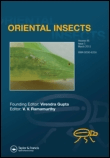
ORIENTAL INSECTS
Fostering Innovation in Entomological ResearchORIENTAL INSECTS is a distinguished journal dedicated to advancing the field of Insect Science, published by the reputable Taylor & Francis Ltd. With its long-standing history since 1967, this journal provides a platform for innovative research focused specifically on the diverse insect fauna of the Oriental region, encompassing topics such as taxonomy, ecology, physiology, and behavior. The journal is indexed with an ISSN of 0030-5316 and an E-ISSN of 2157-8745, making it easily accessible to a global audience. Although it currently does not operate under an Open Access model, its rigorous peer-review process ensures the dissemination of high-quality research. As a Q4 journal in the Insect Science category for 2023 and ranked 103 out of 181 in Scopus, ORIENTAL INSECTS remains a vital resource for researchers, professionals, and students seeking to enhance their understanding of insect biodiversity and conservation. Located in the United Kingdom, it is committed to promoting the latest scientific findings and fostering collaboration among entomologists worldwide, contributing significantly to the academic community.
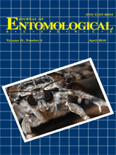
JOURNAL OF ENTOMOLOGICAL SCIENCE
Connecting Scholars through Entomological ExcellenceJOURNAL OF ENTOMOLOGICAL SCIENCE, published by the Georgia Entomological Society Inc, is a crucial resource in the field of insect science and ecology. With a rich history since its inception in 1993, the journal provides a platform for innovative research and comprehensive reviews addressing various aspects of entomology. Although not an open-access journal, it is highly regarded within its community, holding a Q3 ranking in Agronomy and Crop Science, Ecology, Evolution, Behavior and Systematics, and Insect Science as of 2023. Each issue promises to contribute valuable insights to professionals, researchers, and students alike, making it an essential publication for those looking to stay abreast of developments in entomological studies. The journal's editorial commitment ensures that it remains at the forefront of entomological research through rigorous peer reviews and a dedication to scholarly excellence.
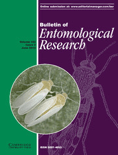
BULLETIN OF ENTOMOLOGICAL RESEARCH
Bridging the Gap Between Insects and Agricultural AdvancementsBULLETIN OF ENTOMOLOGICAL RESEARCH, published by Cambridge University Press, is a prestigious journal that has been at the forefront of entomological research since its inception in 1910. With an impressive track record extending through to 2024, this journal serves as a vital platform for advancing knowledge in various related fields, notably Agronomy and Crop Science and Insect Science, where it ranks in the top quartile (Q2) and maintains a commendable position within the Scopus rankings in its categories. Notably, its contributions also intersect with Medicine in a broader scope, fostering interdisciplinary insights. While access to the journal content is not classified as 'Open Access,' its rigorous peer-reviewed articles are crucial for researchers, professionals, and students seeking to enhance their understanding of entomology and its applications in agronomy and beyond. The journal's impact is reflected in its notable percentile rankings, emphasizing its relevance and influence in the academic community. Located at the heart of the UK, the BULLETIN OF ENTOMOLOGICAL RESEARCH continues to be an essential resource for those dedicated to the study and understanding of insects and their impacts on agriculture and health.
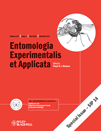
ENTOMOLOGIA EXPERIMENTALIS ET APPLICATA
Pioneering research for a deeper understanding of insects.ENTOMOLOGIA EXPERIMENTALIS ET APPLICATA is a premier journal dedicated to advancing the understanding of insect science through innovative research and thorough experimental methodologies. Published by Wiley, this esteemed journal has been at the forefront of entomology since its inception in 1958, with its latest convergence extending until 2024. With a commendable Impact Factor and categorically positioned in the Q2 quartile across both Ecology, Evolution, Behavior and Systematics and Insect Science fields, it plays a pivotal role in the dissemination of critical findings. The journal is indexed in Scopus, ranking 43rd out of 181 in Insect Science, showcasing its relevance and stature within the academic community, while maintaining a robust visibility among scholars. Given its rigorous peer-review process and a commitment to quality and innovation, ENTOMOLOGIA EXPERIMENTALIS ET APPLICATA serves as a vital resource for researchers, professionals, and students aiming to deepen their insights into entomological research.
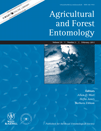
AGRICULTURAL AND FOREST ENTOMOLOGY
Innovating pest management for a greener future.AGRICULTURAL AND FOREST ENTOMOLOGY is a leading journal published by Wiley, focusing on the interface of entomology, agriculture, and forestry. With a robust impact reflected in its Q2 and Q1 quartile rankings in prominent categories like Agronomy and Crop Science, Forestry, and Insect Science, this journal serves as a vital platform for researchers and professionals seeking to advance their understanding of insect impacts on agricultural and forest ecosystems. Since its inception in 1999, it has provided a comprehensive collection of high-quality research, facilitating interdisciplinary discussions and innovations in pest management, biodiversity, and sustainable practices. Although it does not currently offer Open Access, the journal continues to uphold rigorous peer-review standards, ensuring that published works maintain a profound scientific value. As of 2023, its Scopus rankings further signify its prominence in the field, engaging a global audience keen on addressing the pressing challenges faced within agricultural and forest sciences.
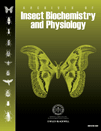
ARCHIVES OF INSECT BIOCHEMISTRY AND PHYSIOLOGY
Unraveling the Secrets of Insect Physiology and BiochemistryArchives of Insect Biochemistry and Physiology, an esteemed journal published by WILEY, stands at the forefront of advancing the understanding of insect physiology and biochemistry. With an ISSN of 0739-4462 and E-ISSN of 1520-6327, this journal serves as a critical resource for researchers and professionals in the fields of biochemistry, insect science, and physiology. As of 2023, it holds a respectable impact factor with a Q3 ranking in Biochemistry and Physiology, and a Q2 in Insect Science, highlighting its relevant contributions to these disciplines. The journal has maintained a continuous publication history from 1983 to 2024, hosting pioneering research and review articles that inform both academic and practical applications in entomology. While it does not currently offer open access, it is accessible through various institutional subscriptions, ensuring widespread availability of essential findings. This journal plays a vital role in elucidating the complex biochemical pathways and physiological adaptations of insects, fostering knowledge that is crucial for ecological research, agricultural development, and conservation efforts.